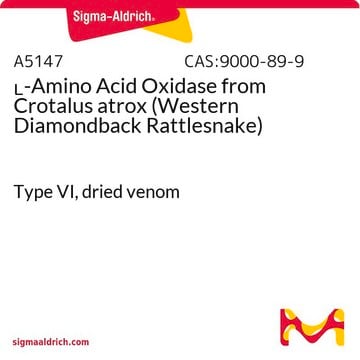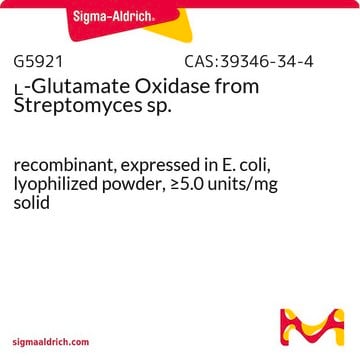A9253
L-Amino Acid Oxidase from Crotalus adamanteus
Type I (dried venom)
Sinónimos:
L-AAO, L-Amino acid: oxygen oxidoreductase (deaminating)
About This Item
Productos recomendados
biological source
Crotalus adamanteus
Quality Level
type
Type I (dried venom)
Type I
form
powder
mol wt
~130 kDa
solubility
H2O: soluble 1.0 mg/mL, clear(lit.)
storage temp.
−20°C
¿Está buscando productos similares? Visita Guía de comparación de productos
General description
Application
Biochem/physiol Actions
Preparation Note
signalword
Danger
hcodes
Hazard Classifications
Acute Tox. 1 Inhalation - Acute Tox. 2 Dermal - Acute Tox. 2 Oral
Storage Class
6.1A - Combustible acute toxic Cat. 1 and 2 / very toxic hazardous materials
wgk_germany
WGK 3
flash_point_f
Not applicable
flash_point_c
Not applicable
Certificados de análisis (COA)
Busque Certificados de análisis (COA) introduciendo el número de lote del producto. Los números de lote se encuentran en la etiqueta del producto después de las palabras «Lot» o «Batch»
¿Ya tiene este producto?
Encuentre la documentación para los productos que ha comprado recientemente en la Biblioteca de documentos.
Los clientes también vieron
Nuestro equipo de científicos tiene experiencia en todas las áreas de investigación: Ciencias de la vida, Ciencia de los materiales, Síntesis química, Cromatografía, Analítica y muchas otras.
Póngase en contacto con el Servicio técnico

















